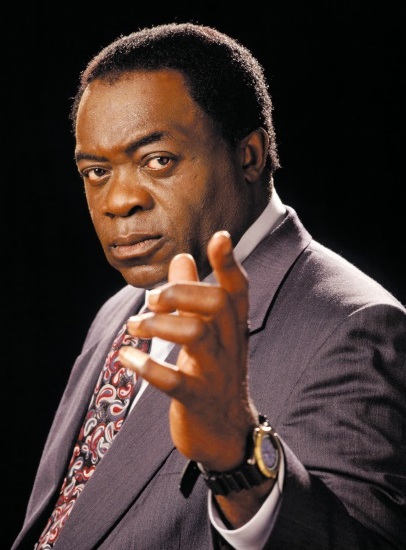
Yaphet Frederick Kotto (November 15, 1939note – March 15, 2021) was a prolific American actor of film, television and theatre.
He was well-known for having broken down a number of Hollywood stereotypes about black characters. He is recognized by most audiences as a character actor who regularly commands the scenes he's in for his powerful performances. He was known to regularly turn down roles which are badly written stereotypically "black" parts, although he would on occasion have to do a film just to put food on the table. His breakout film was Nothing But a Man, which is now regarded as a classic.
He played the Big Bad in the James Bond film Live and Let Die,note Parker in Alien and Lieutenant Giardello in Homicide: Life on the Street.note He also turned down the role of Picard in Star Trek: The Next Generation and Lando in Star Wars,note which he would later regard as a mistake.
He arguably kickstarted Blaxploitation cinema with his role as a killer in The Liberation of L. B. Jones, where he is shown onscreen killing a white character (which had not been seen previously in American cinema). Other blaxploitation films he appeared in are The Limit (1972)note and Truck Turner (1974).note
He was of Cameroonian descent on his father's side (the latter emigrated to the USA in the 1920s), and in fact he comes from a direct male-lineage of the Cameroon royalty (as described in his autobiography Royalty). Further, he claimed in his book that he was also a direct descendant of Queen Victoria. He was a practicing Jew, and spoke about experiencing both racism and antisemitism while growing up in The Bronx.
His latest work was providing the voice for Parker in Alien: Isolation. He was also a member of the Academy.
His wife announced his passing on March 15, 2021.
Works he appeared in with pages on TV Tropes:
- Nothing But a Man (1964) as Jocko
- 5 Card Stud (1968) as George "Little George"
- The Thomas Crown Affair (1968) as Carl
- Live and Let Die (1973) as Kananga/Mr. Big
- Blue Collar (1976) as John "Smokey" James
- Alien (1979) as Parker note
- Brubaker (1980) as Richard Coombes
- The Star Chamber (1983) as Det. Harry Lowes
- Warning Sign (1985) as Col. Morse
- The Running Man (1987) as William Laughlin
- Midnight Run (1988) as Alonzo Mosely note
- Freddy's Dead: The Final Nightmare (1991) as Doc
- The Puppet Masters (1994) as Ressier
- Two If By Sea (1996) as Agent O'Malley
- Witless Protection (2008) as Ricardo Bodi/Alonzo Mosely
- The Big Valley (2 episodes, 1966–67) as Lobo Brown/Damien
- Tarzan (1 episode, 1967) as Kesho
- Bonanza (1 episode, 1968) as Child Barnett
- Daniel Boone (2 episodes, 1968–69) as Luke/Jonah
- Hawaii Five-O (1 episode, 1969) as LCpl. John T. Auston
- Mannix (1 episode, 1969) as Gabe Johnson/Gabriel Dillon
- Gunsmoke (1 episode, 1970) as Piney Biggs
- Night Gallery (1 episode, 1971) as Buckner
- Fantasy Island (1 episode, 1983) as Big Gus Belly
- The A-Team (1 episode, 1983) as Charles F. "East-Side Charlie" Struthers
- Hill Street Blues (1 episode, 1985) as Calvin Matthias
- Alfred Hitchcock Presents (1 episode, 1985) as Convict
- Murder, She Wrote (1 episode, 1987) as Lt. Bradshaw
- Father Dowling Mysteries (1 episode, 1990) as Lt. Fleming
- SeaQuest DSV (1 episode, 1993) as Capt. Jack Clayton
- Homicide: Life on the Street (122 episodes, 1993–99) as Lt. Al Giardello note
- Law & Order (1 episode, 1997) as Lt. Al Giardello
- Homicide: The Movie (TV movie, 2000) as Lt. Al Giardello
- Alien: Isolation (2014) as Parker (voice)
